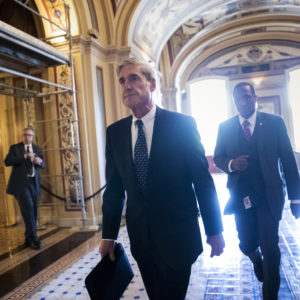Special Counsel Robert Mueller has already accomplished a great deal in his criminal and counterintelligence investigation of Russian interference in our 2016 elections, possible collusion with the Trump campaign, obstruction of justice and related matters. He has already secured indictments or guilty pleas from 19 individuals and three companies, and cases are proceeding against former Trump campaign chair Paul Manafort and others. Now negotiations are reportedly underway concerning a possible Mueller interview with President Trump.
For three very good reasons, Trump should agree to such an interview promptly.
First of all, past presidents of both parties have agreed to give interviews or testimony under similar circumstances. On the Republican side, George W. Bush was interviewed by a special counsel investigating the leak of CIA agent Valerie Plame’s identity, Gerald Ford gave a videotape deposition in a criminal case, and Ulysses S. Grant was deposed in a criminal case. Among Democrats, Bill Clinton was interviewed by a special prosecutor about the Whitewater real estate deal, and later testified before a grand jury about Monica Lewinsky, and Jimmy Carter gave four depositions in criminal cases having nothing to do with him directly.
Although a subpoena had been issued and then withdrawn in the Lewinsky matter, not once has a president flatly refused to be interviewed or to testify in a criminal case. As the saying goes, no one is above the law.
In fact, if Trump does refuse, he can be subpoenaed by Mueller to testify before a grand jury. Although no one knows for sure how the Supreme Court would resolve the dispute if Trump continued to refuse to testify despite a subpoena, precedent strongly favors Mueller’s position. In the late 1990s, the Supreme Court ruled that while in office, President Clinton was subject to a civil lawsuit, which did not rise to the level of seriousness of a criminal proceeding, from former Arkansas state employee Paula Jones. He ultimately had to testify by videotape deposition in that case. In 1974, the court ruled unanimously that President Nixon could not shield his White House tapes from a subpoena by the Watergate special prosecutor, rejecting Nixon’s assertion of executive privilege in light of the need for evidence in a criminal case and the “fundamental demands of due process of law.”
That brings us to the third reason Trump should agree to be interviewed: it’s simply the right thing to do, both for him and the country.
At this stage of the investigation, there is no question that Trump has knowledge that no one else has about whether there was, in fact, collusion between his campaign and Russia — and about whether he intended to obstruct justice by taking actions like firing former FBI director James Comey.
Without a voluntary interview, Mueller’s investigation will take much longer, particularly if Trump then resists a subpoena and an extensive court fight ensues. Nothing could prolong the Mueller investigation further, and more squarely contradict Trump’s avowed goal of ending it quickly, than for him to refuse to cooperate and be interviewed.
Especially in light of the many charges and counter-charges leveled against and by Trump’s team, the American people deserve to hear from Trump himself in response to the serious questions raised by the Mueller investigation. In fact, a March CNN pollshows that 75 percent of Americans want Trump to agree to testify under oath if requested by the special counsel, with less than one in five saying he shouldn’t.
The most fundamental question is this: What does President Trump have to hide? If his answer is nothing, then he has every reason to want to answer questions from Robert Mueller. If he does have something to hide, that is all the more reason for him to testify — whether voluntarily or not. Either way, the American people deserve to know the truth.

